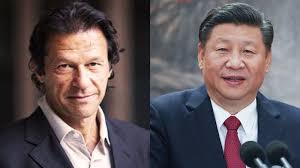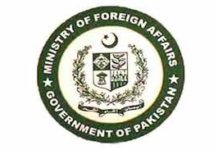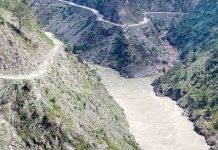Monitoring Desk
Foreign Minister Shah Mahmood Qureshi has that Chinese President Xi Jinping was “very keen” to visit Pakistan and that discussions in that regard had taken place between both sides.
“He (Xi) is very keen to come,” Qureshi told a news conference in the capital Islamabad on Monday. “Both sides understand that his visit will be of an extraordinary nature. For that there is a need to understand the flux in regional and international situation and also to prepare before his trip,” he explained.
The minister said that a “roadmap” was discussed and further interaction between the two countries will be seen in the coming days. The date of President Xi’s visit will be decided keeping in mind the “developments and the Covid-19 situation”, Qureshi said.
His remarks come days after President Xi, in a letter to his Pakistani counterpart President Arif Alvi, said that his country was ready to work with Pakistan to deepen the building of “China-Pakistan Community of Shared Future” and to jointly promote cooperation among regional countries, according to English newspaper, Daily Dawn.
وزیرِ خارجہ مخدوم شاہ محمود قریشی کا دفترِ خارجہ میں پریس کانفرنس سے خطاب۔ لائیو لنکhttps://t.co/AbQt3lHBmF
— Team SMQ (@TeamSMQ) August 24, 2020
The Chinese president further said that both Pakistan and China were working to maintain the “momentum of peace and development in the region”.
In today’s press talk, Qureshi also explained that the purpose of his recent visit was to “understand [China’s] current state of mind and gauge their stance on India”.
“I can tell you that I didn’t see any hesitation, their (China’s) stance is very clear,” he said.
The foreign minister also talked about the relations of other regional countries with India, saying that the impression that Saarc member countries were “leaning towards India” was dissolving. He referred to India’s conflict with Nepal and the recent resolution passed by the latter’s parliament in that regard in addition to “a lack of warmth” in India’s ties with Bangladesh.
The foreign minister dispelled reports of deterioration in relations between Saudi Arabia and Pakistan, saying that such rhetoric was based on “speculation”.
Responding to a question regarding the veracity of reports that Saudi Arabia had demanded from Pakistan money the kingdom had lent in addition to suspending a loan oil facility, Qureshi said these were just “speculative” reports and that “no decision like that was made” before proceeding to take a dig at the media for “keeping your shop vibrant” by reporting based on “mere assumptions”.
“Your question is based on an assumption. These are speculations. No decision like that was taken,” he told the reporter and, in a light vein, added: “If you don’t speculate, how will you run your shop, at the end of the day, you have to report something. We don’t want your shop to close, it should be more vibrant and I will try to make it so, don’t worry.”
Reports of souring ties between the kingdom and Pakistan emerged after Qureshi, during a talk show, bluntly asked the Saudi-led Organisation of Islamic Cooperation (OIC) to stop dilly-dallying on the convening of a meeting of its Council of Foreign Ministers (CFM) on the Kashmir issue, Daily Dawn reported.
“I am once again respectfully telling OIC that a meeting of the Council of Foreign Ministers is our expectation. If you cannot convene it, then I’ll be compelled to ask Prime Minister Imran Khan to call a meeting of the Islamic countries that are ready to stand with us on the issue of Kashmir and support the oppressed Kashmiris,” he had said.
The Foreign Office had later defended his remarks, saying that his statement was a reflection of people’s aspirations and expectations from the OIC to raise the Kashmir issue internationally were not against diplomatic norms.
Following this outburst, reports in the media suggested that Saudi Arabia hit back by making Pakistan pay back $1 billion it had lent earlier, forcing Pakistan to borrow from another close ally China. There were also rumours that the kingdom had suspended a credit oil facility given to Pakistan.
Soon after, Army chief General Qamar Javed Bajwa visited Saudi Arabia in what was said to be a fence mending trip, seeking to calm diplomatic strains as financial support for Islamabad hung in the balance, though the official line was that the visit was pre-planned and “primarily military affairs oriented”.
During Monday’s press conference, however, the foreign minister insisted that ties between Saudi Arabia and Pakistan, which he described as “people-centric”, had always been strong and will remain so in the future.
“Our relationship is not new, and it is people-centric, it’s not just between governments. So if I have a relationship with you, I will also have expectations. If we don’t have any relationship, why would we have expectations? So, on Kashmir, Pakistanis have a clear stance and have expectations from our friends which we keep expressing and will continue to do so.”
He recalled that the OIC’s Kashmir contact group had held a virtual meeting this year, which was also attended by the Saudi foreign minister, where a statement prepared by Pakistan was approved by all members, including Saudi Arabia.
Qureshi said multiple resolutions had been passed by the OIC that were “clear, straightforward and in accordance with Pakistan’s stance”.
“There is no ambiguity but absolute clarity. I am telling you this clearly, there is no change in Saudi Arabia’s stance on Kashmir. And OIC’s stance is before you, now we have to decide how we will take this forward.”
Responding to a question regarding Pakistan’s stance on ties with Israel, Qureshi said that Pakistan “will not come under international pressure”.
“Prime Minister Imran Khan has given a clear statement on this in accordance with Quaid-i-Azam’s stance. We will not come under any international pressure,” he declared.
“You can see that though they took some time, Saudi Arabia took a similar stance and I am sure that most of the Muslim ummah shares this position.”
Qureshi also spoke about ongoing talks between the Afghan Taliban and Kabul, saying progress was being made towards a final peaceful solution.
While answering a question, Qureshi revealed that his meeting with an Afghan Taliban delegation, which is currently in Pakistan on the government’s invitation, will be held tomorrow to discuss the way forward in the peace process.
He admitted that there were a lot of complications in the negotiations between the Taliban and United States and now with the Afghan government, but added that they were being overcome one by one and the process was moving forward.
The foreign minister said he had also discussed the situation in Afghanistan and the progress of the talks with his Chinese counterpart in his recent trip to China. He told reporters that China was “supporting” the Afghan peace process and had “played a constructive role”.















